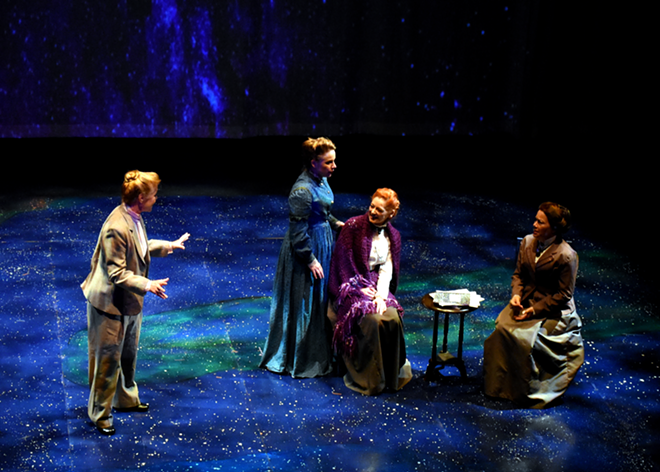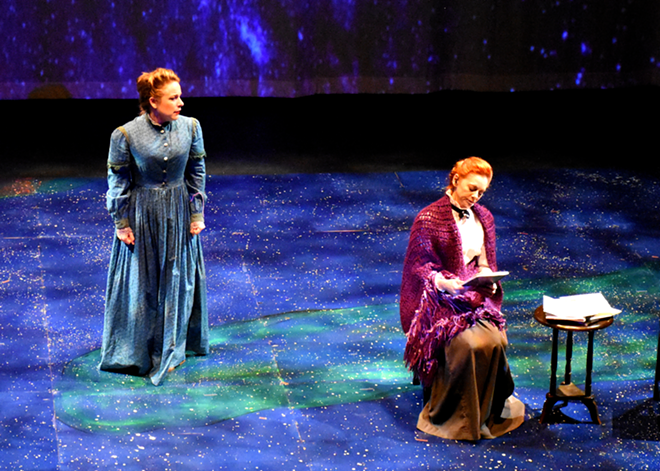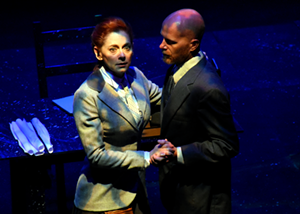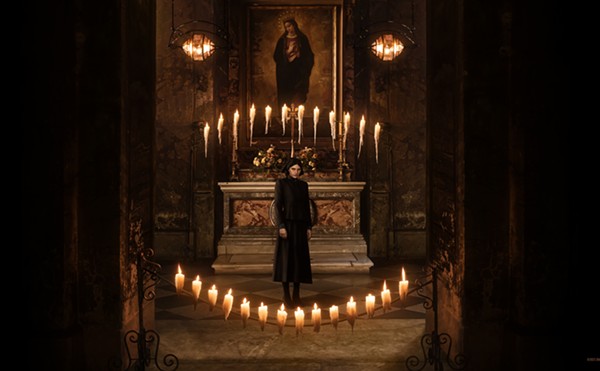Silent Sky
3 1/2 stars
$20. Through May 22. Thurs.-Sat., 8 p.m.; Sun., 3 p.m. Smith Black Box Theatre, Tampa Preparatory School, 727 W. Cass St., Tampa. tamparep.org.
Henrietta Leavitt was an astronomer of the early 20th century whose work was pivotal in proving that the cosmos includes galaxies besides our own Milky Way. Nearly a hundred years after her death, Leavitt remains mostly unknown to Americans, even though the great Edwin Hubble, discoverer of the expanding universe, relied on her work and insisted that she deserved the Nobel Prize.
Thanks to Silent Sky, Lauren Gunderson’s play about Leavitt’s life and career, we’re able to acquaint ourselves with this previously-ignored scientific figure, and ponder how many other women of distinction have been lost to history because of their sex. With the iridescent Emilia Sargent as Leavitt, and Amanda Bearss’ large projections of star fields as a backdrop to her tale, the current Tampa Repertory Theatre production is both inspiring and visually beautiful. If it lacks at times for suspense, it makes up for it with sincerity and political — yes, feminist — significance. It’s good to meet Henrietta Leavitt.
The story begins with our heroine, a Wisconsin pastor’s daughter, being accepted for a job at the Harvard Observatory. But as she tells her sister Margaret (the delightful Karissa Barber), she won’t be able to live in Cambridge unless her father gives her the money set aside for her dowry. With funds in hand, Leavitt proceeds to Harvard, where she discovers that, being a woman, she won’t be permitted to use its huge telescope. Instead she’s to become one of three women “computers,” whose job is to catalogue thousands of stars on photographic plates. Her supervisor will be not Edward Charles Pickering, head of the Observatory, but Peter Shaw (the talented Derrick Phillips), a somewhat less exalted presence (and an invention of playwright Gunderson). Leavitt will work side by side with Annie Cannon (Caroline Jett), an imperious, impatient woman, and Willamina Fleming (Lynne Locher), a much warmer and good-humored colleague. As Leavitt develops a relationship with these other members of the so-called “harem” and entertains Shaw’s bumbling courtship, she also makes groundbreaking discoveries about pulsing Cepheid stars that will lead to the most unexpected reimagining of Earth’s place in the universe.
Of course, the challenge playwright Gunderson faces is to make Leavitt’s not-very-dramatic method — poring over photographic plates and calibrating the brightness of stars — sufficiently fascinating to hold our attention for two full acts. She almost manages this, though we learn more from Leavitt’s growing excitement over her discoveries than we do from her descriptions of the work or its implications. But there are two other plot elements meant to keep us in our seats: Leavitt’s attempt to win the respect of the peremptory Annie Cannon, and the development of Leavitt’s romance with Peter Shaw. The first of these proceeds efficiently, but the latter — the match with Shaw — takes so long to go anywhere and consists of so many false starts, it’s more exasperating than satisfying. The fault isn’t the actors’: As written by Gunderson, Shaw just happens to be the most clumsy, self-doubting, wannabe suitor this side of the Charles River, and when he finally gets around to announcing his intentions, we’ve pretty much lost interest. Then, once the relationship has a chance to flower, Leavitt is called away to Wisconsin, and so geographical miles are added to psychological distance in what becomes one massively bungled love story. It could have been better presented.
What couldn’t be much better is Sargent’s portrayal of Leavitt. In past productions Sargent has demonstrated that she’s one of our top actresses; in Silent Sky she reminds us why: Her astronomer is complex, prismatic, multi-dimensional. Dazzled by the night sky, assiduous in her labors, this is a woman we’re not used to seeing on stage, a devoted seeker of new worlds, a mind as big as her heart. At one moment, Sargent’s Leavitt is demanding the right to perform her idiosyncratic, pioneering scientific work, a moment later she’s laying siege to Cannon’s disdain, a moment after that patiently, smilingly enduring Shaw’s bumbling advances. This is life from many angles, and its profoundly convincing. Sargent and the other performers are capably directed by Connie LaMarca-Frankel, costumed in period clothes by Lea Umberger, all on Amanda Bearss’ nearly-bare set backed by those gorgeous projections of a cosmos fretted with golden fire. Even without a play in front of them, these star-photos would be stunning. As a context for Leavitt’s trajectory, they’re wonderfully eloquent.
And Silent Sky, even with its flaws, is a drama worth seeing. Henrietta Leavitt: you’re back. No, you haven’t been forgotten.
We should have known you all along.
Want to know what the stars mean? Get inside Mark Leib's head here.





















